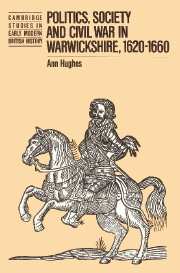Book contents
- Frontmatter
- Contents
- List of maps and plan
- List of tables
- Preface
- Acknowledgements
- Abbreviations and notes
- 1 The social context
- 2 Peers and gentlemen before the Civil War
- 3 Public affairs 1620–1639
- 4 The coming of the Civil War 1639–1642
- 5 Military rule 1642–1649
- 6 Militancy and localism in Warwickshire politics 1643–1649
- 7 The impact of the Civil War
- 8 Politics and religion 1649–1662
- Appendix 1 Local governors 1620–1660
- Appendix 2 Active county committeemen 1643–1647
- Bibliography of manuscript and printed sources
- Index
2 - Peers and gentlemen before the Civil War
Published online by Cambridge University Press: 18 December 2009
- Frontmatter
- Contents
- List of maps and plan
- List of tables
- Preface
- Acknowledgements
- Abbreviations and notes
- 1 The social context
- 2 Peers and gentlemen before the Civil War
- 3 Public affairs 1620–1639
- 4 The coming of the Civil War 1639–1642
- 5 Military rule 1642–1649
- 6 Militancy and localism in Warwickshire politics 1643–1649
- 7 The impact of the Civil War
- 8 Politics and religion 1649–1662
- Appendix 1 Local governors 1620–1660
- Appendix 2 Active county committeemen 1643–1647
- Bibliography of manuscript and printed sources
- Index
Summary
Although the Earl of Northampton and the Lord Brooke, at least, were considerably richer than the vast majority of the county gentry, most of the peers frequently resident in Warwickshire were not crucially separated from the leading gentry in wealth, status or influence. No peer held an unquestioned predominance in county society or monopolised links between the county and the central government. This was probably a recent development in Warwickshire for in the 1570s and 1580s the Dudley brothers, Ambrose Earl of Warwick and Robert Earl of Leicester, commanded a wide following amongst the county gentry and, of course, were also closely linked with the central government.
For most peers, and for many of the leading gentry too, the county was not important enough to be the sole or even the main arena of their activities. The government service, or court favour, to which many of them owed their ennoblement took peers away from regular involvement in county society; the extreme example of this process being Sir Robert Digby of Coleshill, created Baron of Geashill in Ireland in 1620. The Digbys had built up a large estate in north Warwickshire since the early sixteenth century, and Sir Robert had been knight of the shire in 1601. His marriage to an Irish heiress, and his own and his son's government service in Ireland meant that their visits to Coleshill became more and more infrequent and they cannot be considered part of county society in the pre-Civil War period. By a reverse process new peers were introduced to Warwickshire like Robert Carey, Earl of Monmouth, granted Kenilworth Castle by Charles I in 1625.
- Type
- Chapter
- Information
- Publisher: Cambridge University PressPrint publication year: 1987



